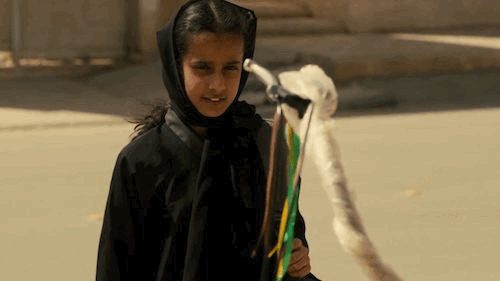My girlfriend and I have this joke between us, where I’ve compiled my top 25 favorite movies of all time, but actually the list is ever-growing and has long since left behind a number anywhere close to 25. This is not to say I am so easily influenced by any old sappy rom-com, but instead is only evidence of the seriousness of my Netflix addiction.
In any case, I consider all of my movie-watching experience enough to transform me into a reliable source for a good movie recommendation, and thus a solid judge of a film’s emotional quality.
In short, Wadjda was beautiful. The title character can only be described as spunky, with her Converse high-tops and the broadness of her grin, the quickness of her smart mouth and her mind for entreprenuership. I find that I no longer want to be like others when I grow up; rather, Wadjda is who I wish I was as a child. If I had had half that moxy at her age, who knows where I would be now.
The film goes on to document the girl’s dedication to saving up for a bicycle, a toy that she is repeatedly told is not for girls, as it is believed to harm the reproductive system, and is generally considered umseemly. Nevertheless, she schemes and studies her way to success, learning to recite the Quran for a school competition (with a cash prize, of course). All the while, subplots form, showcasing the female life in the midst of a male-dominated society: her mother’s fears of her husband leaving to take another wife; the principal’s rumored interactions with a non-relative man; the rule-breaking, magazine-reading girls at school.
If you’re a devout Wes Anderson fan, you’ll appreciate the monochrome quality of the movie–the pale yellow-cream is omnipresent, from the sand and sky to homes and buildings. This calmness of hue contrasted nicely with the small chaoses building in the film’s plot, and only made Wadjda stand out more starkly, racing her friend Abdullah down the dusty street or walking home from school. In a part of the world that restricts many of womens’ freedoms, the brashness of this little girl is striking.
A lot went into Wadjda‘s creation. In Saudi Arabia, women cannot be seen in public interacting with men outside the family, so the director Haifaa al-Mansour had to give directions to her male crew via walkie-talkie from the back of a van. She had to get govermental approval before she could film, and though she recieved funding from a Saudi company, much of her funding was from a German source. Not only was it the first feature-length Saudi film to be directed by a woman, it was the first to be shot entirely within the country, in which the first cinema opened just this past April following a decades-long ban.
This truly is a historic film. If you haven’t seen it yet, I urge you to do so! You will feel changed.





